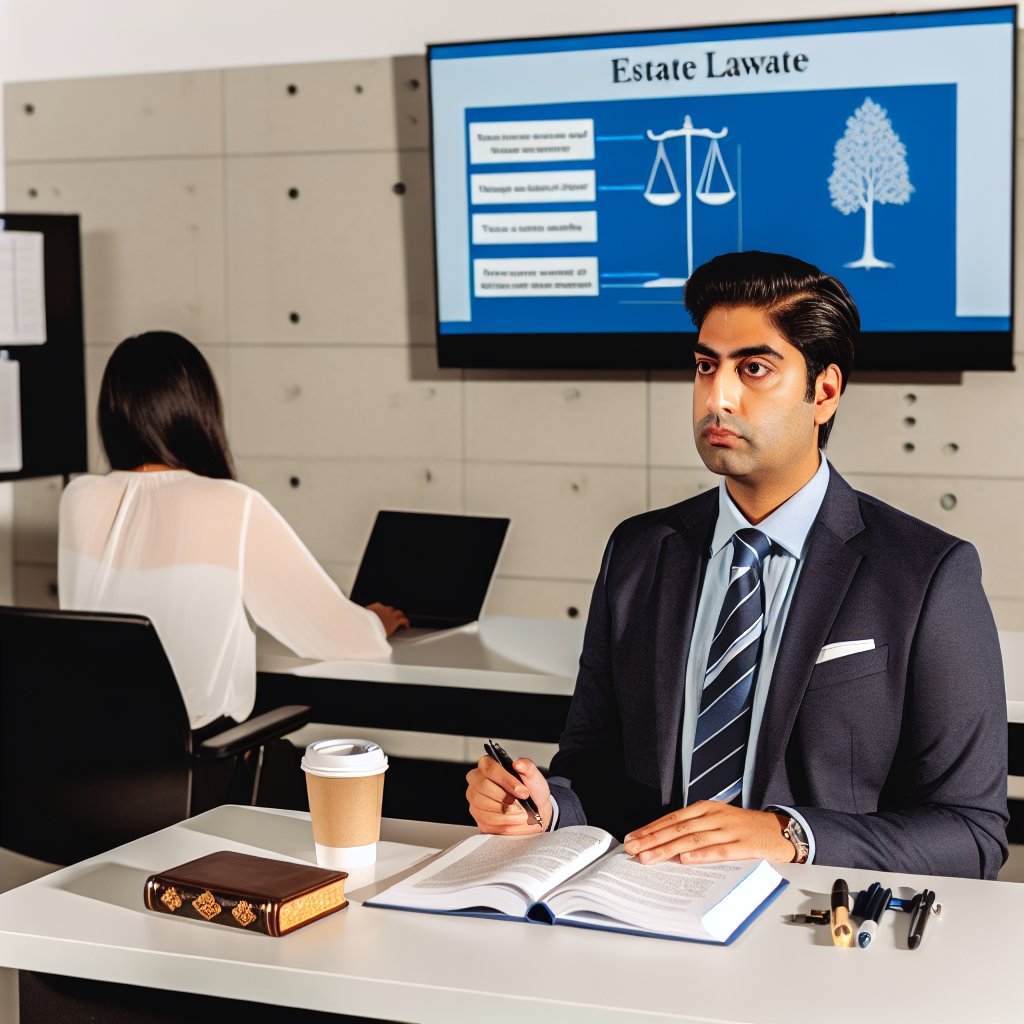Importance of Continuing Education in Trust and Estate Practice
Enhancing Professional Competence
Continuing education elevates the competency of trust and estate practitioners.
It keeps them informed about evolving laws and regulations.
Moreover, enhanced knowledge leads to better client service.
Practitioners can effectively address diverse client needs.
Ultimately, this fosters greater trust and confidence from clients.
Staying Updated with Industry Trends
The trust and estate landscape continually changes.
New trends emerge regularly, impacting practice methods.
Continuing education helps professionals stay relevant.
Workshops, conferences, and seminars provide valuable insights.
Additionally, these platforms facilitate networking opportunities.
Adapting to Technological Advancements
Technology increasingly plays a vital role in the industry.
Practitioners must adapt to new tools and software.
Continuing education programs often include technology training.
This training enhances efficiency and accuracy in workflows.
Thus, professionals can serve clients more effectively.
Maintaining Licensure and Credentials
Many states require continuing education to maintain licensure.
Practitioners must be aware of their specific requirements.
Regular training ensures compliance with ethical standards.
Additionally, it allows for the renewal of necessary certifications.
Ongoing education thus supports professional integrity.
Improving Risk Management Strategies
Trust and estate practitioners face various risks in their practice.
Continuous learning equips them with risk management skills.
Educational programs discuss best practices and case studies.
These insights help in identifying and mitigating risks.
Overall, education fosters proactive risk management approaches.
Unlock Your Career Potential
Visualize a clear path to success with our tailored Career Consulting service. Personalized insights in just 1-3 days.
Get StartedOverview of Regulatory Requirements for Trust and Estate Practitioners
Understanding Regulatory Frameworks
Trust and estate practitioners operate within strict regulatory frameworks.
These regulations vary by jurisdiction and practice area.
Practitioners must stay informed about changes in laws and policies.
Ultimately, compliance enhances professional integrity and client trust.
Essential Licensing and Certification
Many jurisdictions require practitioners to obtain specific licenses.
For example, attorneys often need to pass the bar exam.
Similarly, financial advisors may require additional certifications.
Maintaining these licenses demands continuous education and renewal.
Compliance with Ethical Standards
Ethical standards govern the conduct of trust and estate practitioners.
Practitioners must uphold confidentiality and avoid conflicts of interest.
Failure to comply can lead to severe professional penalties.
Continuing education can help practitioners understand and apply these standards.
Reporting and Recordkeeping Obligations
Trust and estate practitioners must adhere to strict reporting requirements.
Accurate and timely recordkeeping helps mitigate legal risks.
Practitioners should use secure systems to store sensitive client information.
Regular audits can ensure compliance with regulatory expectations.
Understanding Taxation Regulations
Tax laws significantly impact trust and estate practices.
Practitioners must stay updated on federal and state tax regulations.
Continuing education helps them navigate complexities in estate taxation.
Knowledge of tax implications can enhance asset planning strategies for clients.
Staying Informed about Changes
The regulatory landscape is constantly evolving.
Practitioners should engage in ongoing training and education.
Webinars, workshops, and seminars offer valuable updates and insights.
Networking with peers can also provide critical information on best practices.
Types of Continuing Education Programs Available
Webinars and Online Courses
Webinars provide convenient learning options for busy professionals.
They allow participants to engage from any location.
Online courses offer structured content over a set duration.
These programs may cover specialized topics in trust and estate law.
Participants can earn credits toward their continuing education requirements.
In-Person Seminars and Conferences
In-person events offer unique networking opportunities.
Attendees can interact directly with industry experts.
Conferences often feature panels discussing recent industry trends.
Workshops enable hands-on learning experiences.
These formats encourage collaboration among peers.
Certification Programs
Certification programs provide advanced knowledge and credentials.
These programs often focus on niche areas within the practice.
Completion of a certification can enhance career prospects.
Many organizations offer recognized certification in trust and estate planning.
Self-Study Courses
Self-study courses provide flexibility in learning.
These programs allow practitioners to set their own schedules.
Participants can choose topics that align with their interests.
Many self-study options use multimedia formats for an engaging experience.
These formats enable learners to absorb content at their own pace.
State Bar Association Programs
State bar associations regularly host educational sessions.
These sessions often meet mandatory continuing education requirements.
Attendees gain insights from local experts in trust and estate law.
Bar associations may also offer resources on evolving legal standards.
Networking opportunities arise during these events as well.
Learn More: The Importance of Succession Planning for Canadians
Top Institutions Offering Trust and Estate Education
Overview of Leading Institutions
Numerous institutions provide education for trust and estate practitioners.
These programs enhance skills and knowledge in this essential field.
Participants can find varying formats, including online courses and in-person classes.
University of Miami School of Law
The University of Miami offers a specialized program in estate planning.
This program includes both advanced topics and practical applications.
Additionally, their faculty comprises renowned experts in the field.
Students benefit from networking opportunities and real-world scenarios.
New York University School of Law
New York University features a well-respected tax law program.
Among its offerings, students can pursue courses focused on trust and estate law.
The program emphasizes the integration of theory and practice.
Furthermore, NYU hosts seminars led by leading industry professionals.
Northwestern University Pritzker School of Law
Northwestern University provides comprehensive trust and estate education.
The curriculum covers a wide range of relevant legal principles.
Courses include estate administration, wealth management, and tax law.
Moreover, the school encourages participation in legal clinics for hands-on experience.
American Bar Association (ABA)
The American Bar Association offers continuing education opportunities.
They provide various webinars and workshops tailored for practitioners.
Participants can learn about current trends and best practices.
In addition, the ABA promotes networking among trust and estate professionals.
Certified Specialist Programs
Various states have established certified specialist programs.
These programs allow practitioners to demonstrate expertise in trust and estate law.
Participants must meet specific educational and experiential criteria.
Moreover, certification can enhance credibility and career prospects.
Online Learning Platforms
Numerous online learning platforms offer flexible educational options.
Coursera and edX provide courses from top universities and institutions.
These platforms often allow students to learn at their own pace.
Additionally, they frequently include assessment opportunities to track progress.
Importance of Trust and Estate Education
Continuing education remains vital for trust and estate practitioners.
Significant institutions deliver valuable knowledge and skills.
Practitioners must explore various options to enhance their expertise.
Explore Further: The Future of Compliance Officer Jobs in Canada
Benefits of Specialized Training in Trust Administration
Enhanced Knowledge and Skills
Specialized training expands knowledge in trust and estate laws.
Participants gain insights into complex regulations and practices.
This training enhances their professional skills significantly.
Certified practitioners become more competent in their roles.
Furthermore, they are better equipped to handle diverse client needs.
Improved Client Relationships
Well-trained practitioners build stronger relationships with clients.
Understanding the intricacies of trust administration fosters trust.
Clients appreciate expertise and confidence in their advisors.
Additionally, effective communication leads to better service delivery.
Career Advancement Opportunities
Specialized training opens doors for career advancement.
Professionals can pursue higher-level positions and responsibilities.
Training enhances their credibility in the industry.
This recognition can lead to increased job security and salary growth.
Networking and Knowledge Sharing
Training programs facilitate networking with peers and experts.
Participants benefit from sharing insights and experiences.
Networking fosters collaboration and future partnerships.
Access to a broader professional network can lead to opportunities.
Staying Current with Trends
Trust and estate planning fields constantly evolve.
Specialized training ensures practitioners stay updated on trends.
It includes changes in laws, regulations, and best practices.
Being informed helps them provide the best advice to clients.
Explore Further: Advancing Your Career as a Canadian Legal Researcher

The Role of Technology in Continuing Education for Practitioners
Enhancing Learning Opportunities
Technology creates unique opportunities for practitioners in the trust and estate field.
Online courses allow participants to learn at their own pace.
This flexibility makes education more accessible for busy professionals.
Webinars provide real-time interaction with experienced speakers.
Moreover, recorded sessions enable attendees to revisit complex topics.
Regular Updates on Regulations
Technology keeps practitioners informed about changing regulations.
Online platforms share updates instantly across the industry.
This ensures that practitioners stay compliant and informed.
Regular newsletters and bulletins can automate this process.
Additionally, mobile applications offer alerts on new developments.
Networking and Collaboration
Virtual communities foster networking among trust and estate practitioners.
Online forums and social media groups encourage discussion and collaboration.
These platforms help professionals share insights and challenges.
Furthermore, they facilitate mentorship opportunities across geographic boundaries.
As a result, practitioners can build valuable connections worldwide.
Access to a Wealth of Resources
The internet provides access to vast resources for continuing education.
Websites, blogs, and online journals serve as valuable knowledge bases.
Practitioners can enhance their skills through countless online resources.
Video tutorials and podcasts present unique ways to learn new concepts.
Therefore, technology enriches the overall learning experience significantly.
Improving Engagement and Retention
Interactive learning tools increase engagement among participants.
Quizzes, polls, and discussion boards make education more interactive.
This active participation promotes better retention of information.
Additionally, gamification enhances motivation and learning enjoyment.
As a result, practitioners find continuing education more appealing.
Learn More: Understanding the Role of Law Clerks in Canadian Firms
Networking Opportunities through Continuing Education Events
Engaging with Peers and Experts
Continuing education events serve as excellent venues for networking.
Practitioners can interact with fellow trust and estate professionals.
These events often feature experts in the field.
Attendees can gain insights from their experiences and knowledge.
Building Meaningful Connections
Networking at these events fosters relationships that can last a lifetime.
Professionals can meet potential collaborators or mentors.
Strong connections often lead to referrals and partnerships.
Moreover, sharing personal experiences enhances these relationships.
Participating in Workshops and Panels
Workshops and panels provide immersive networking opportunities.
Participants can engage in discussions around emerging trends.
This interaction allows for the exchange of ideas and best practices.
Collaboration often stems from these enriching conversations.
Utilizing Online Platforms
Many organizations offer online forums for networking as well.
These platforms allow members to connect beyond physical events.
Online tools facilitate discussions and knowledge sharing.
Active participation in these platforms strengthens professional ties.
Follow-Up and Continued Engagement
Follow-up after events is crucial for relationship-building.
A simple message can keep connections alive and productive.
Continuing to engage with peers helps maintain rapport.
Furthermore, sharing relevant resources can foster goodwill.
Trends in Trust and Estate Education: What Practitioners Need to Know
Emerging Educational Focus Areas
Trust and estate practitioners face evolving legal landscapes.
New regulations and practices require continuous learning.
Professionals should focus on tax reform education.
Furthermore, environmental, social, and governance (ESG) topics are increasingly important.
Staying updated on digital assets is crucial.
Importance of Interprofessional Collaboration
Collaboration among professionals enhances service delivery.
Estate planners, tax advisors, and attorneys must work together.
This cooperation improves client trusts and estate planning.
Networking opportunities are essential for sharing knowledge.
Additionally, cross-disciplinary courses can benefit practitioners.
Technological Advancements in Education
Digital tools are reshaping trust and estate learning.
Online platforms now offer flexible learning options.
Webinars allow experts to share insights rapidly.
Furthermore, virtual conferences connect practitioners globally.
Technology enhances the accessibility of crucial knowledge.
The Role of Certification and Continuing Education
Certification programs are vital for professional development.
They provide credibility and demonstrate expertise.
Continuing education requirements vary by jurisdiction.
Practitioners should prioritize accredited courses and workshops.
Staying current aids in navigating complex legal environments.
Building a Learning Culture
Fostering a culture of learning benefits all practitioners.
Organizations should encourage ongoing education initiatives.
Mentoring programs can enhance knowledge transfer.
Team training sessions improve overall competency.
Additionally, sharing best practices is beneficial for all.
Additional Resources
Digital Asset Entanglement: Unraveling the Intersection of Estate …
Medals, Awards and Prizes | Osgoode Hall Law School – York …




